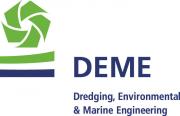General information
As any man-made activity, also dredging activities influence the habitat of all kinds of species in all kinds of levels. Hand in hand with the increasing environmental awareness, more and more environmental constraints are imposed on these dredging activities. However, these constraints may have a huge effect on the execution and the cost of the dredging project.
The aim of this course is to better appreciate the relation between dredging and the environment, in order to better understand the needs and possibilities of both involved parties. As such, this course aims to bridge the gap between the engineers involved with the dredging activities and the scientists studying the natural habitat. This is an Expert Training course for MARES Doctoral students.
Covered topics will include dredging equipment and related dredging processes, methods for placement of dredged materials, environmental impact of dredging and placement activities (as indicated by parameters such as turbidity, noise, emissions), mitigation actions and their influence on the project and dredging of contaminated soils. Impact of these activities on the species themselves is not covered. The teaching methods include group training and power point presentations.
Content
The highlighted icons, represent the fields of education (in compliance with ISCED Classification) engaged during this course/programme.
Venue
Ghent, Belgium
Marine Biology Research Group
Ghent University
Krijgslaan 281/S8
B-9000 Gent, Belgium
Application
Cost:
<p>200€ for enrolment and handouts.</p>
Application Procedure:
Please submit your application on : http://econsort.ugent.be/regis.asp?frm=1187 by February 1st 2015
Enrolment Deadline: February 1st 2015
Qualification
Credits:
As any man-made activity, also dredging activities influence the habitat of all kinds of species in all kinds of levels. Hand in hand with the increasing environmental awareness, more and more environmental constraints are imposed on these dredging activities. However, these constraints may have a huge effect on the execution and the cost of the dredging project.
The aim of this course is to better appreciate the relation between dredging and the environment, in order to better understand the needs and possibilities of both involved parties. As such, this course aims to bridge the gap between the engineers involved with the dredging activities and the scientists studying the natural habitat. This is an Expert Training course for MARES Doctoral students.
Covered topics will include dredging equipment and related dredging processes, methods for placement of dredged materials, environmental impact of dredging and placement activities (as indicated by parameters such as turbidity, noise, emissions), mitigation actions and their influence on the project and dredging of contaminated soils. Impact of these activities on the species themselves is not covered. The teaching methods include group training and power point presentations.
Please submit your application on : http://econsort.ugent.be/regis.asp?frm=1187 by February 1st 2015
Enrolment Deadline: February 1st 2015

 DEME
DEME

